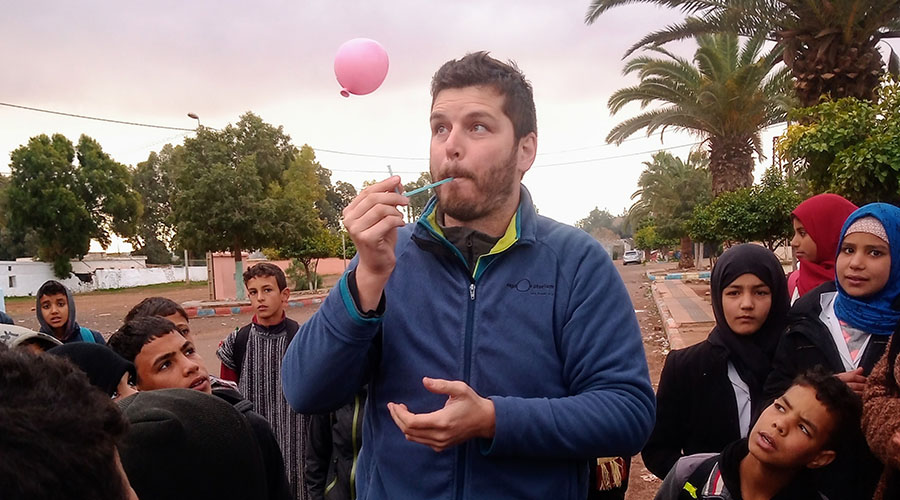
November 2023 (Volume 32, Number 11)
Science From a Bike: One Teacher’s Cycling Journey to Share Physics Experiments Around the World
Michael Gregory leans on APS JNIPER’s coffee hours and workshops to support his global outreach efforts.
By Liz Boatman | October 13, 2023

Credit: Michael Gregory
Michael Gregory demonstrating Bernoulli's principle outside of a school in Machraa Ben Abbou, Morocco.
A Canadian man named Michael Gregory has bicycled the equivalent of a lap around the Earth, through some 40 countries, for one purpose: sharing physics with teachers and students.
It helped that arriving by bicycle was a point of interest,” he says.
Gregory, who has taught science in four countries, says he’s seen firsthand how an idea can start in one classroom and “spread first throughout a school, then a district, region or country” — but translating across borders or languages tends to be slow.
Six years ago, to share ideas for educational experiments, Gregory launched “My Favourite Experiments,” a YouTube series showcasing K-12 physics experiments for teachers. But to build the project’s collection, he needed to connect with many more science educators.
So he bought a bike, negotiated a reduced contract for his teaching job in San Francisco, and hit the road, first pedaling north to his home country. There, he began ‘cold connecting’ with science teachers across Canada. The effort he put into cycling to meet teachers and students demonstrated his commitment to the project, he says.
Then, in fall 2022, APS launched the Joint Network for Informal Physics Education and Research (JNIPER). The community is tailored to folks like Gregory, who design, facilitate, or study informal physics learning activities. Registration for JNIPER activities is free, and APS membership is not required.
Gregory has been a regular attendee of JNIPER’s virtual monthly “Coffee Hours,” each of which features a different guest speaker. The coffee hours — all recorded and freely accessible on JNIPER’s YouTube channel — have offered “a great opportunity to meet like-minded people who are dedicated to high-quality physics education,” he says.
Today, Gregory is France’s Ambassador for Europe’s two biggest science teaching networks, Science on Stage and Scientix. For Science on Stage, Gregory organizes a monthly online meeting, “Experiment Share,” which features live science experiments presented by teachers in 5 to 10 countries.
Another series is “Science on Your Stage,” in which Gregory aims to run workshops in every country he visits. On his most recent adventure, Gregory cycled across the Sahara Desert from Morocco to Senegal, stopping along the way to give free science shows featuring low-cost experiments.
Gregory’s “My Favourite Experiments” YouTube channel now boasts more than 200 videos of experiment demonstrations, most 10 minutes or less. Some have received thousands of views, and hundreds of teachers and students have participated. The content is free for everyone.
But producing outreach content is only half the battle. Gregory says he’s realized the importance of evaluation, to ensure that his efforts are actually helping science teachers. JNIPER’s workshops have given him tools to use for evaluation, and they’ve boosted his confidence as he plans and implements those assessments.
For example, he’s used the assessment tools in his new project, a course called “Particle Physics for Teachers,” and his new science show, “Particle Detectives,” developed in collaboration with CERN. In its first two weeks, Gregory has performed “Particle Detectives” in Kazakhstan, Italy, and Serbia, and it’s been translated into five other languages.
Gregory presented both projects at JNIPER’s September Coffee Hour and was thrilled by other attendees’ feedback. He says he found the expertise shared on program evaluation to be especially helpful, as he gears up for his next big journey: a doctorate in particle physics outreach and education.
“Only a minority of kids will grow up to become scientists,” he says. “Yet they can all benefit from an understanding and appreciation of science.”
Interested in meeting others in informal physics education, or hearing tips for designing and evaluating outreach activities? JNIPER’s final coffee hours of 2023 are scheduled for Nov. 29, 12 - 1:30 p.m. ET, and Dec. 20, 1 - 2:30 p.m. ET. Register on JNIPER’s website.
Liz Boatman is a staff writer for APS News.
©1995 - 2024, AMERICAN PHYSICAL SOCIETY
APS encourages the redistribution of the materials included in this newspaper provided that attribution to the source is noted and the materials are not truncated or changed.
Editor: Taryn MacKinney
November 2023 (Volume 32, Number 11)
Articles in this Issue
